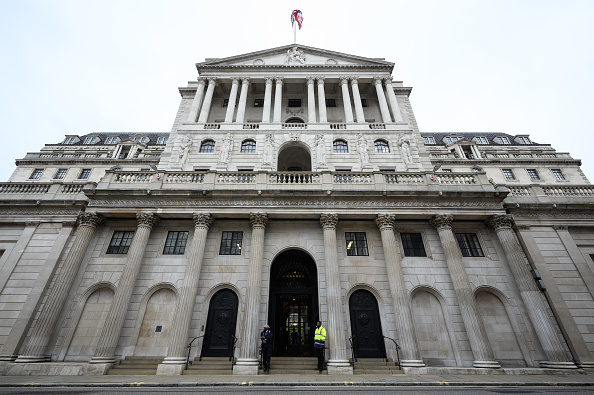Bank of England hikes rates for third successive meeting in bid to catch rampant inflation

The Bank of England today hiked interest rates for the third successive meeting for the first time since 1997 as it tries to catch up with rampant inflation that is threatening to derail the UK economy.
Rate setters at Threadneedle Street sent borrowing costs 25 basis points higher, taking them to pre-pandemic levels of 0.75 per cent.
The sharp policy pivot has been triggered by the Bank zeroing in on the highest rate of inflation in a generation by cooling the British economy after the central bank flooded it with stimulus during the Covid-19 crisis.
The pound plunged 0.2 per cent against the dollar on the news to buy $1.3112. The FTSE 100 jumped.
The monetary policy committee (MPC) left rates unchanged at a record low from March 2020 until it lifted them at the back end of last year, despite signs of hotter than expected inflation emerging around June 2021.
The cost of living has already climbed to a three decade high of 5.5 per cent, but is expected to trend much higher in the coming months to a potential double-digit peak.
The Bank now expects inflation to scale above its expectations due to the Russia-Ukraine war sending energy prices soaring, extending a trend in which the MPC has consistently undershot its inflation forecasts since the onset of Covid-19.
“The effects of Russia’s invasion of Ukraine [will] likely accentuate both the peak in inflation and the adverse impact on activity by intensifying the squeeze on household incomes,” the Bank said.
“Inflation is expected to increase further in coming months, to around eight per cent in 2022 second quarter, and perhaps even higher later this year,” it added.
However, prices were already set to accelerate much quicker than the Bank’s two per cent target even before Moscow sent troops into Ukraine, with Threadneedle Street’s own experts in early February pencilling in a 7.25 per cent peak in April.
The energy watchdog is almost certain to lift the cap on bills again in October to account for higher oil and gas prices, prompting some economists to bet the cost of living will top 10 per cent.
Brits are bracing for the worst fall in living standards in a generation, likely leading them to slash spending, which will weigh on UK economic growth in 2022.
The MPC voted 8-1 in favour of hoisting rates 25 basis points. One member, Jon Cunliffe, favoured holding rates at 0.5 per cent.
At the Bank’s last meeting in February, four members of the MPC voted to hike rates 50 basis points.
The Bank has progressed cutting its stock of bond holdings under its quantitative easing programme, announcing around £30bn of assets had run off its balance sheet.
So-called passive quantitative tightening, in which the Bank stops reinvesting the proceeds from maturing debt, started after the central bank’s February meeting.
Before the announcement, markets expected the Bank to ramp up its tightening cycle this year, with investors betting rates will land at 2.25 per cent by the end of 2022.
This would mean the Bank would have to lift borrowing costs a full two percentage points during 2022, something it has not done in a calendar year since the late 1980s.
Expectations rolled back after the news.